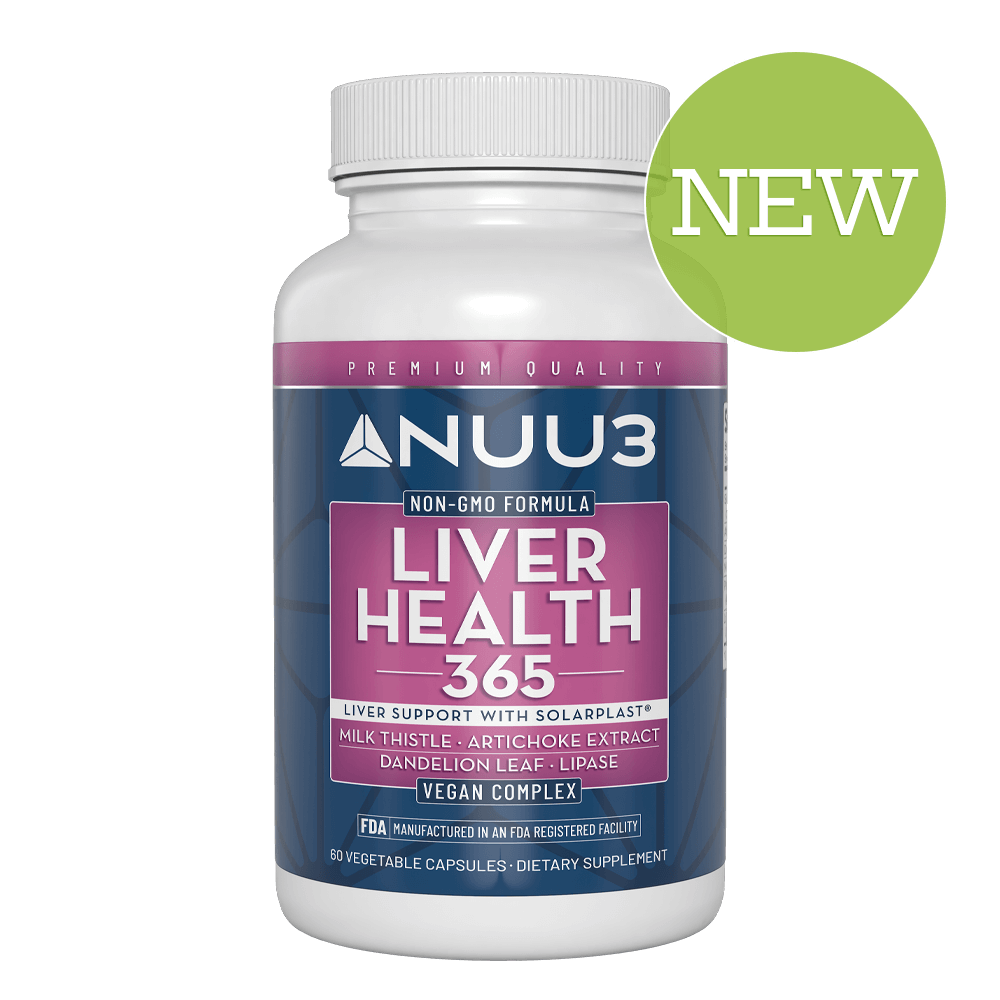What Vitamin Helps Crepey Skin?

Does your skin feel saggy or loose? Is it noticeably thinner and more fragile in certain areas, like the upper arms or under the eyes? If this is the case, you probably have crepey skin.
Crepey skin is a common problem women experience with age, especially during menopause [1]. The plummeting estrogen levels can significantly impact the skin, and the less estrogen your body makes, the higher your chance of developing sagging, thinning, and wrinkles.
Many experts recommend taking a vitamin for crepey skin, as the nutrition you consume is a central factor in your skin health. If you aren’t consuming adequate antioxidants, healthy fats, and vitamins, your poor diet may speed up skin aging.
If you nourish your system with a balanced diet high in omega-3 fats, vegetables, and fruits, you can boost skin elasticity and give your complexion the nutrients it requires for optimal health. However, some vitamins are better than others for skin health and appearance. In this article, we’ll highlight the best vitamins for crepey skin.
What is Crepey Skin?
Crepey skin has the texture of crepe paper with a thin, wrinkled appearance. Sun exposure over time can break down elastin to cause this issue. Although the fibers can heal to some extent, the older you get, the harder it is for them to repair completely.
Think of your skin as an elastic waistband that gets looser, thinner, and prone to tears the longer you wear it. Many people complement their topical routine with supplements for skin health to restore their youthful appearance and enjoy a radiant glow.
Crepey Skin vs. Wrinkled Skin: How to Recognize the Difference
Crepey skin develops due to declining levels of collagen and elastin, the natural proteins that give your skin its stretch and bounce. This process occurs naturally with age and may result in soft, delicate, thin, crepey skin.
The issue can result in thinning skin all over your body and impacts the surface layer (epidermis) and the deeper layer (dermis). Your skin gradually appears limper and thinner, resembling tissue paper or a crêpe, hence the term "crepey."
Hereditary factors may also impact whether you get crepey skin, so if close family members developed it young, you have a higher risk. Most people [2] start to notice crepey skin in their 40s, but in some cases, it could show up as early as the 20s. The key risk factors include massive weight loss, weight gain, or regular tanning bed use.
In contrast, Wrinkled skin [3] has a significantly different texture. Wrinkles begin as small creases that can deepen over time. They are lines that develop on your skin, often due to repeated facial expressions like smiling, frowning, or squinting.
They can also occur from prolonged exposure to environmental factors, such as smoking, dust, or UV rays. Wrinkles are most likely to appear on your arms, neck, and face, and these lines can become more prominent as you age.
The Causes of Crepey Skin
Aging can negatively impact the skin, leading to a decline in collagen and elastin for wrinkles and fine lines. In addition, levels of hyaluronic acid also decrease and impact skin hydration. According to a research review in the Dermatology Practical & Conceptual Journal [4], skin tissue may weaken, lose elasticity, and decrease in hydration with age.
In some cases, supplementing with a vitamin for crepey skin can supply your body with nutrients and restore the skin barrier. You can also acquire all of the necessary vitamins through your diet. However, before we answer the question, “What vitamin helps crepey skin?” we should discuss the primary causes of the issue. Some of the most notable contributors include:
- Dehydration - This occurs when you don’t drink enough water and fail to moisturize your skin consistently.
- Cosmetics - Using products packed with harsh chemicals or strong exfoliants may contribute to crepey skin.
- Smoking - If you smoke regularly, the toxins you inhale are a risk factor for crepey skin.
- Excess Sun Exposure - Overexposure to UV rays over time accelerates the breakdown of collagen and elastin, for a greater chance of developing crepey skin.
- Climate - Climate factors like high winds, low humidity, and severe heat may damage the skin and contribute to a crepey complexion.
- Anxiety - Anxiety increases levels of the hormone cortisol, which elevates blood sugar to produce glycation end products (AGEs). These agents cause elastin and collagen to decline, for looser skin that is more prone to wrinkles and a crepey appearance.
- Lack of Sleep - Sleep deprivation can impact the body’s ability to produce collagen, leading to possible aging and crepey skin.
- Drastic Fluctuations in Weight - When you lose or gain weight too rapidly, the skin often adapts by stretching and returning to its original state. However, as we grow older, the skin’s ability to contract and regain its former tightness drastically decreases.
- Alcohol - Drinking releases the toxic compound acetaldehyde into the body, which can negatively impact skin health by drawing away moisture.
- Medications - Drugs like prednisone can affect the thickness and texture of the skin.
Do you want to know what vitamin helps crepey skin? Keep reading, as the information in the coming section should answer this question and more.
Which Vitamin for Crepey Skin Can Come in Handy?
Finding the right vitamin for crepey skin can make a world of difference in improving your skin health. Certain vitamins, like C and E, are renowned for their antioxidant compounds that support collagen production and boost the skin’s resilience and elasticity. These are the benefits of several key vitamins in more detail.
1. Vitamin E
Research [5] indicates that Vitamin E has potent photoprotective qualities, meaning that it can protect the skin from the harmful effects of sunlight. In addition, this nutrient has hydrating, firming, and anti-aging properties making it the most practical vitamin for crepey skin.
Vitamin E may enhance the structure, elasticity, and softness of the dermis and epidermis. By incorporating this nutrient into your diet, you may safeguard your skin from the swelling and redness associated with sun exposure. If you don’t get enough Vitamin E from your diet, consider taking supplements for skin health to give your complexion added nourishment.
2. Vitamin A
If you’re still asking yourself, “What vitamin helps crepey skin?” you should know that Vitamin A is well-known for its powerful anti-wrinkle and anti-aging properties. Vitamin A is a fat-soluble nutrient that belongs to the category known as retinoids [6].
Vitamin A stimulates the growth of skin cell receptors to enhance the protective function of the epidermis, reducing moisture loss. This vitamin can also reinforce the skin’s protective barrier and increase collagen production for a reduction in wrinkles and crepey skin.
If you are looking for a Vitamin A-rich supplement with a potent formula, NUU3 Hair, Skin & Nail Gummies is an excellent choice. These tasty gummies promote radiant skin, healthy hair growth, and stronger nails.
3. Vitamin C
Vitamin C plays a vital role in maintaining skin health, according to the research [7]. It functions both as a powerful antioxidant and a crucial element for collagen production. Vitamin C can help prevent the effects of sun exposure and promote natural healing. If you want to supplement your diet with added value, NUU3 Daily Multivitamin Gummies are a powerhouse of essential nutrients. Packed with Vitamin C, these gummies nourish the complexion and support skin health.
4. B Vitamins
The B vitamins are essential supplements for skin health, and when your body lacks these vital nutrients, you are more likely to experience skin problems [8]. They are crucial for almost every bodily function, including converting food into energy, supporting organ health, enhancing metabolism, skin, and hair, and improving cell growth.
For a natural boost to your energy levels and nervous system, try NUU3 Nature's Superfuel. This product helps you seize the day and get the nutrients your body craves.
5 Tips to Prevent Crepey Skin
Now that you know which vitamin for crepey skin to take, here are some additional effective tips for preventing and improving the condition.
- Protect Your Skin From UV Rays: Apply sunscreen every morning, seek shade, and wear protective clothing when you’re out in the sun.
- Follow a Balanced Diet: Include plenty of omega-3 fatty acids, antioxidants, and Vitamins A, B, C, and E in your diet.
- Exfoliate: Try to exfoliate your skin with a scrub once or twice a week.
- Lower Your Stress: Practice exercises that reduce stress, like meditation and yoga.
- Improve Your Sleep Quality: Ensure that you get enough shut-eye every night.
Can crepey skin be reversed? While you can’t get rid of it completely, there are some measures you can take to improve your skin’s appearance. Use products with collagen-boosting ingredients like retinoids and hydrating compounds like hyaluronic acid.
FAQs
Does drinking water improve crepey skin?
Yes, drinking enough water daily for proper hydration can help maintain skin suppleness and elasticity and improve crepey skin.
What protein tightens saggy skin?
The key proteins that tighten sagging skin are collagen and elastin. You may consider taking supplements for skin health, as they often contain ingredients that boost levels of these proteins and other vitamins and minerals that your body lacks.
Should you moisturize crepey skin?
Yes, moisturizing twice daily as part of your regular skincare routine is key to reducing crepey skin.
Takeaway
Your skin needs all the nourishment and moisture it can get, and the best vitamin for crepey skin depends on which nutrients you are lacking in your diet. For example, you may require more of Vitamins A, B, C, or E for optimal skin and overall health. Consume more of these nutrients daily to give your skin a youthful appearance.
References
1] ↑ https://www.webmd.com/menopause/ss/slideshow-better-skin-after-menopause
2] ↑ https://health.clevelandclinic.org/whats-causing-your-crepey-skin-and-how-can-you-fix-it/
3] ↑ https://my.clevelandclinic.org/health/diseases/10984-wrinkles
4] ↑ https://www.ncbi.nlm.nih.gov/pmc/articles/PMC8824545/
5] ↑ https://www.ncbi.nlm.nih.gov/pmc/articles/PMC7827176/
6] ↑ https://www.ncbi.nlm.nih.gov/pmc/articles/PMC6791161/
7] ↑ https://lpi.oregonstate.edu/mic/health-disease/skin-health/vitamin-C
8] ↑ https://www.ncbi.nlm.nih.gov/pmc/articles/PMC10099312/












